一般过去时在几种常见句型中的运用
语法知识点一般过去时的用法和句型
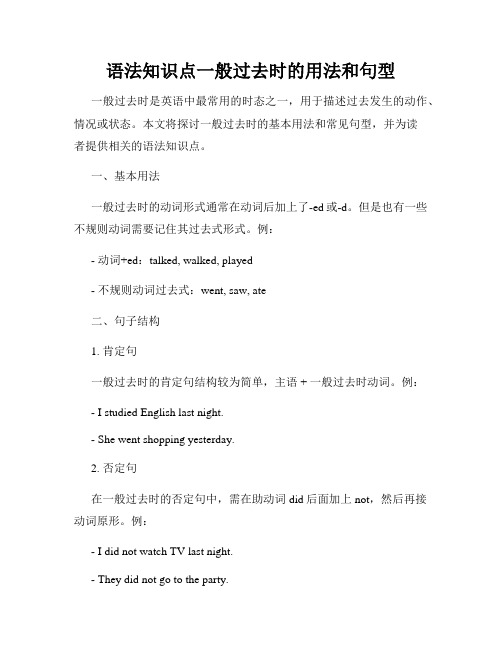
语法知识点一般过去时的用法和句型一般过去时是英语中最常用的时态之一,用于描述过去发生的动作、情况或状态。
本文将探讨一般过去时的基本用法和常见句型,并为读者提供相关的语法知识点。
一、基本用法一般过去时的动词形式通常在动词后加上了-ed或-d。
但是也有一些不规则动词需要记住其过去式形式。
例:- 动词+ed:talked, walked, played- 不规则动词过去式:went, saw, ate二、句子结构1. 肯定句一般过去时的肯定句结构较为简单,主语 + 一般过去时动词。
例:- I studied English last night.- She went shopping yesterday.2. 否定句在一般过去时的否定句中,需在助动词did后面加上not,然后再接动词原形。
例:- I did not watch TV last night.- They did not go to the party.3. 一般疑问句一般过去时的一般疑问句需要将助动词did放在句首,然后将主语放在did后面,接原形动词。
例:- Did you finish your homework yesterday?- Did they visit their grandparents last weekend?三、时间状语一般过去时常与表示过去时间的状语连用,以明确动作或状态发生的时间。
以下是一些常用的时间状语:- yesterday- last week/month/year- in 1990- a few days ago- when I was a child- at that time- in the past四、陈述句和疑问句的回答在陈述句中,我们通常用完整的句子回答,而在疑问句中,我们可以用简略回答或完整回答。
例:- Did you go to the party? - Yes, I did. / No, I didn't.- Did he finish his homework? - Yes, he did. / No, he didn't.五、经常与一般过去时连用的词汇1. 过去连续性的动作:- was/were + 动词-ing:I was playing basketball when she called me. - used to + 动词原形:I used to walk to school when I was young.2. 时间副词:- ago:He moved to New York two years ago.- before:I had never seen such a beautiful scenery before.- when:I was reading a book when the phone rang.3. 愿望:- wish + 一般过去时:I wish I knew the answer.六、一般过去时的注意事项1. 与现在的区别:一般过去时描述过去的动作、情况或状态,与现在时相对应。
一般过去时的用法

一般过去时的用法一般过去时表示过去某个时间发生的动作或存在的状态。
常和表示过去的时间状语连用。
如:last year, yesterday等;也可表示过去经常反复发生的动作,常和often, always等频率副词连用。
例如:I saw him in the street yesterday. 昨天我在街上看见他了。
Li Mei always went to school on foot last year. 去年李梅总是步行上学。
注意:也可以用“used to +动词原形”表示过去经常或反复的动作。
eg. We used to get up early. 我以前总是早起。
(意指现在不早起了)1.一般过去时的形式:动词be: 第一人称单数和第三人称单数用was, 其余的人称一律用were。
动词have: 一律用had, 没有人称和数的变化。
行为动词:一律用过去式,没有人称和数的变化,行为动词的过去式有两类,一类是规则动词,另一类是不规则动词。
一般过去时动词的肯定、否定、一般疑问句和简略回答以及特殊疑问句的形式见列表:肯定、否定形式行为动词的过去时的否定式,要使用助动词do 的过去式did,后面的谓语动词要还原为原形。
注意:在非正式语如口语中,was not, were not, had not和did not 可以分别缩写成wasn’t, weren’t, hadn’t和didn’t。
2.一般过去时的几种句型(这里只讲行为动词)肯定句结构为:主语+动词的过去式+其他。
如:He went to the toy store yesterday. 他昨天去玩具店了。
否定句结构为:主语+did not (didn’t)+动词原形+其他。
如:He didn’t go to the toy store yesterday. 他昨天没去玩具店。
一般疑问句的构成:Did+主语+动词原形+其他?如:1) -Did you go to Beijing last week?-Yes, we did. (No, we didn't.)2) -Did you meet the businessman before?-No, I didn't. (Yes, I did.)特殊疑问句的构成:疑问词+did+主语+动词原形+其他?如:1) -What did you do last night?-I did my homework.2) -Where did you go last week?-I went to Shanghai with my parents.Ⅱ. 行为动词的一般过去式变化规则行为动词的过去式有规则变化和不规则变化两种。
小学一般过去时教学课件

小学一般过去时教学课件2023-10-26contents •一般过去时的定义和特点•一般过去时的基本用法•一般过去时的常见形式•一般过去时的句型和用法•一般过去时的特殊用法及注意事项目录01一般过去时的定义和特点一般过去时是一种动词时态,表示过去某个时间发生的动作或状态。
定义一般过去时由动词的过去式构成,规则动词的过去式是在动词后加上-ed,例如walk→walked,play→played。
不规则动词则需要单独记忆,例如go→went,do→did。
构成时间指向一般过去时的时间指向是过去,它描述的是过去某个时间发生的动作或状态。
语法结构一般过去时的语法结构是动词的过去式,通过加-ed来构成。
表达方式一般过去时可以用在陈述句、疑问句和否定句中,例如I walkedto school yesterday(我昨天走路去学校)。
02一般过去时的基本用法1表示过去的动作或状态23描述过去发生的动作或状态,例如:昨天我去了公园。
描述已经完成的动作或状态,例如:我已经吃过午饭了。
描述持续到过去的动作或状态,例如:他去年住在北京。
描述过去某人在某事上的经历或经验,例如:我去年去过长城。
描述过去的感受或体验,例如:他昨天很开心。
描述过去对某事物的看法或经历,例如:他以前喜欢看动画片。
表示过去的经历或经验表示过去的比较或对比02描述过去两个时间之间的比较或对比,例如:昨天比前天热。
03描述过去两个地点之间的比较或对比,例如:北京比上海繁华。
03一般过去时的常见形式主语+was/werebe动词的一般过去时形式肯定句形式主语+was not/were not否定句形式Was/Were+主语一般疑问句形式do/does的一般过去时形式肯定句形式:主语+did否定句形式:主语+did not一般疑问句形式:Did+主语肯定句形式:主语+had否定句形式:主语+had not一般疑问句形式:Had+主语have/has的一般过去时形式04一般过去时的句型和用法总结词表示“存在”或“位置”。
超详细一般过去时的全面讲解【附练习与答案】
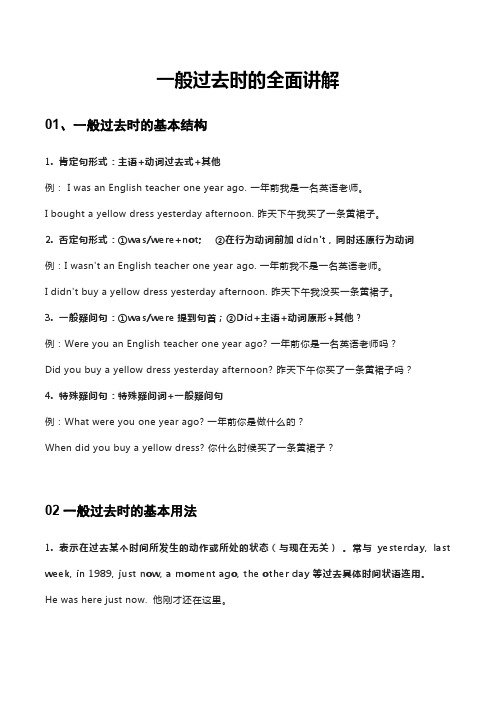
一般过去时的全面讲解01、一般过去时的基本结构1. 肯定句形式:主语+动词过去式+其他例: I was an English teacher one year ago. 一年前我是一名英语老师。
I bought a yellow dress yesterday afternoon. 昨天下午我买了一条黄裙子。
2. 否定句形式:①was/were+not; ②在行为动词前加didn't,同时还原行为动词例:I wasn't an English teacher one year ago. 一年前我不是一名英语老师。
I didn't buy a yellow dress yesterday afternoon. 昨天下午我没买一条黄裙子。
3. 一般疑问句:①was/were提到句首;②Did+主语+动词原形+其他?例:Were you an English teacher one year ago? 一年前你是一名英语老师吗?Did you buy a yellow dress yesterday afternoon? 昨天下午你买了一条黄裙子吗?4. 特殊疑问句:特殊疑问词+一般疑问句例:What were you one year ago? 一年前你是做什么的?When did you buy a yellow dress? 你什么时候买了一条黄裙子?02一般过去时的基本用法1. 表示在过去某个时间所发生的动作或所处的状态(与现在无关)。
常与yesterday, last week, in 1989, just now, a moment ago, the other day等过去具体时间状语连用。
He was here just now. 他刚才还在这里。
What did you do yesterday? 你昨天做了什么事?2. 在过去一段时间内的经常性或习惯性动作。
一般过去时(课件)

一般过去时(课件)一般过去时是英语中表达过去某个时间点或时间段发生的动作或状态的一种时态。
在一般过去时中,动词的形式需要根据主语的人称和数进行变化。
一般过去时的句型结构是:主语 + 动词过去式 + 其他。
一、一般过去时的构成1. 规则动词:在动词原形的基础上加上ed。
例如:work → worked, play → played, study → studied。
二、一般过去时的用法1. 表示过去某个时间点发生的动作。
例如:I went to the library yesterday.2. 表示过去某个时间段内发生的动作。
例如:We playedfootball last weekend.3. 表示过去某个时间段内的状态。
例如:She lived in New York for five years.4. 表示过去习惯性动作。
例如:He used to smoke when he was young.三、一般过去时的疑问句和否定句1. 疑问句:将助动词did放在主语之前,动词原形放在助动词之后。
例如:Did you watch the movie last night?2. 否定句:在主语和动词之间加上助动词did,动词原形变成动词的过去式,并在动词过去式前加上not。
例如:I didn't finish my homework yesterday.四、一般过去时的特殊用法1. 过去进行时:表示过去某个时间点正在进行的动作。
例如:What were you doing at 8 o'clock last night?2. 过去完成时:表示在过去某个时间点之前已经完成的动作。
例如:I had finished my work before he came.3. 过去完成进行时:表示在过去某个时间点之前一直在进行的动作。
例如:She had been waiting for two hours when he finally arrived.一般过去时(课件)一般过去时是英语中表达过去某个时间点或时间段发生的动作或状态的一种时态。
完整word版一般过去时讲解
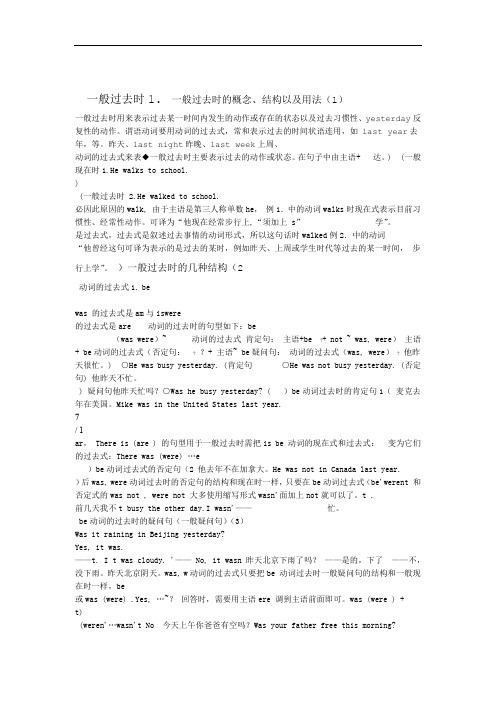
一般过去时1.一般过去时的概念、结构以及用法(1)一般过去时用来表示过去某一时间内发生的动作或存在的状态以及过去习惯性、yesterday反复性的动作。
谓语动词要用动词的过去式,常和表示过去的时间状语连用,如 last year去年,等。
昨天、last night昨晚、last week上周、动词的过去式来表◆一般过去时主要表示过去的动作或状态。
在句子中由主语+ 达。
) (一般现在时1.He walks to school.)(一般过去时 2.He walked to school.必因此原因的walk, 由于主语是第三人称单数he,例1.中的动词walks时现在式表示目前习惯性、经常性动作。
可译为“他现在经常步行上,“须加上 s”学”。
是过去式,过去式是叙述过去事情的动词形式,所以这句话时walked例2.中的动词“他曾经这句可译为表示的是过去的某时,例如昨天、上周或学生时代等过去的某一时间,步行上学”。
)一般过去时的几种结构(2动词的过去式1.bewas 的过去式是am与iswere的过去式是are 动词的过去时的句型如下:be(was were)~ 动词的过去式肯定句:主语+be ?+ not ~ was, were)主语+ be动词的过去式(否定句:??+ 主语~ be疑问句:动词的过去式(was, were)?他昨天很忙。
) ○He was busy yesterday. (肯定句○He was not busy yesterday. (否定句) 他昨天不忙。
) 疑问句他昨天忙吗?○Was he busy yesterday? ( )be动词过去时的肯定句1(麦克去年在美国。
Mike was in the United States last year.7/ 1ar, There is (are ) 的句型用于一般过去时需把is be 动词的现在式和过去式:变为它们的过去式:There was (were) …e)be动词过去式的否定句(2 他去年不在加拿大。
英语英语一般过去时用法总结完整

【英语】英语一般过去时用法总结(完整)一、单项选择一般过去时1.-Late again! Where?-Sorry, I in the heavy traffic, or I would have been here earlier.A. were you: have got stuckB. have you been; have got stuckC. were you; got stuckD. have you been; got stuck【答案】D【解析】【详解】考查时态。
句意:一一又迟到了?你去哪了?一一对不起,我遇上交通拥挤了,否则我就会早点到。
第一空根据语境“又迟到了”可知,已经回来了,所以用现在完成时态,第二空:短语be/getstuckin被困住,动作发生在过去所以用一般过去式,故选D。
2.— You seem to be familiar with the school campus.—I here for three years. It's great to be back.A. have taughtB. taughtC. had taughtD. teach【答案】B【解析】考查时态。
句意:一一你似乎对这个校园很熟悉。
一一我在这里教过3年学。
回来真是太好了。
根据第一句和It's great to be back.可推知,“在这里教过3年学”是过去发生的事情,现在不教了,故用一般过去时态,答案为B。
3.Chinese kites in ancient times in the shape of birds.A. designB. had designedC. were designedD. have been designed【答案】C【解析】考查时态和语态。
句意:在古代中国的风筝被设计成鸟的形状。
根据in ancient times可知,句子用一般过去时态,根据动词与主语是被动关系,故用一般过去时的被动语态,故选C。
一般过去时
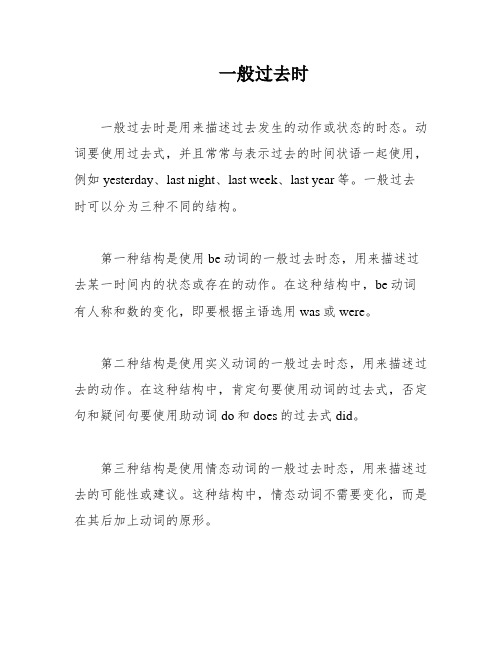
一般过去时一般过去时是用来描述过去发生的动作或状态的时态。
动词要使用过去式,并且常常与表示过去的时间状语一起使用,例如yesterday、last night、last week、last year等。
一般过去时可以分为三种不同的结构。
第一种结构是使用be动词的一般过去时态,用来描述过去某一时间内的状态或存在的动作。
在这种结构中,be动词有人称和数的变化,即要根据主语选用was或were。
第二种结构是使用实义动词的一般过去时态,用来描述过去的动作。
在这种结构中,肯定句要使用动词的过去式,否定句和疑问句要使用助动词do和does的过去式did。
第三种结构是使用情态动词的一般过去时态,用来描述过去的可能性或建议。
这种结构中,情态动词不需要变化,而是在其后加上动词的原形。
需要注意的是,在构成一般过去时的助动词did和didn't后面要跟动词的原形,而且do和does的过去时均为did。
因此,在使用一般过去时时,需要注意动词的形式和助动词的使用。
例如,原句“XXX.”可以改写为“XXX.”,否定句为“I didn’t do XXX.”,一般疑问句为“Did you do your homework yesterday?”,回答可以是“Yes。
I did.”或“No。
I didn’t.”。
1.情态动词的过去式为can→could。
may→might。
must→had to。
will→would。
should→should have。
2.特殊疑问句的构成形式有三种:a。
特殊疑问词+be过去式+主语+其他?b。
特殊疑问词+情态助动词过去式+主语+动词原形+其他?c。
特殊疑问词+do/does过去式+主语+动词原形+其他?例如:What was your former name?(你以前叫什么名字?)Why was he late for school last Monday?(上星期一他为什么迟到?)What could she do twenty years ago?(20年前她能做什么?)3.一般过去时的判断标志词包括:yesterday,the day before yesterday,last + 时间,this morning + 时间 + ago,just now,a moment ago,in + 过去的时间。
一般过去时的结构句型

一般过去时的结构句型
一般过去时是用来描述已经发生过的事情或状态的时态。
在英语中,一般过去时通常由主语+动词的过去式构成。
具体结构和句型如下:
1. 肯定句结构:主语+动词过去式
例如:
- She went to the store yesterday. (她昨天去了商店。
)
- They studied for hours last night. (他们昨晚学习了几个
小时。
)
2. 否定句结构:主语+did not(didn't)+动词原形
例如:
- He didn't go to the party last weekend. (他上个周末没
有去参加聚会。
)
- They didn't watch the movie because it was too late.
(他们没有看电影,因为太晚了。
)
3. 疑问句结构:Did+主语+动词原形?
例如:
- Did she finish her homework yesterday? (她昨天完成了作
业吗?)
- Did they visit the museum when they were in the city? (他们在城市里时参观过博物馆吗?)
需要注意的是,有些动词在构成过去时的时候会发生词形变化,例如:go变成went,write变成wrote,be变成was/were等。
此外,一些常见的时间状语词也可以在过去时的句型中使用,例如:yesterday、last night、last weekend等。
常见一般过去时用法总结

常见一般过去时用法总结一般过去时是英语中常用的时态之一,用于表达过去发生的动作或情况。
下面总结了一些常见的一般过去时用法:1.表示过去的时间:- Yesterday, I went to the mall.- Last week, I visited my grandparents.- In 2024, she traveled to Europe.2.表示过去的习惯或状态:- When I was young, I lived in a small town.- She always ate breakfast before going to school.- They often played tennis on weekends.3.表示过去的动作或事件:- He cooked dinner for his family last night.- We watched a movie at the cinema.- They studied for the exam until late.4.表示过去的想法、感受或态度:- She didn't believe what he said.- They were happy when they heard the news.- I thought it was a great idea.5.表示过去的条件或假设:- If I had known, I would have helped him.- I wish I had studied harder.- She would have won the race if she had trained more.6.表示过去经常性的动作或习惯:- Every day, she walked her dog in the park.- They always went to the beach during summer vacations.- He often played chess with his friends.7.表示过去的计划或安排:- We were supposed to meet at 5 o'clock, but he didn't show up.- They had booked tickets for the concert, but it was canceled.8.表示过去的建议或请求:- He suggested going to the new restaurant for dinner.- I asked him to help me with my homework.- She told me to be careful.9.表示过去的能力或可能性:- She could run very fast when she was younger.- He was able to speak three languages.- They might have gone to the party, but I'm not sure.10.表示过去的频率或数量:- He visited his grandparents twice a month.总结:一般过去时常用于描述过去发生的动作、状态、习惯和想法等。
一般过去时的规则与常见句型解析

一般过去时的规则与常见句型解析一般过去时是英语中最常用的过去时态之一,用来表达在过去某个具体时间或一段时间内发生的动作或存在的状态。
本文将解析一般过去时的规则和常见句型,帮助读者正确运用该时态。
一、一般过去时的规则1. 动词规则变化:一般过去时的动词大部分采用动词过去式的形式,一般是在动词原形后加上-ed。
例如:work → worked, visit → visited.还有一些特殊情况,如:a. 以辅音字母+y结尾的动词,变为过去式时,将y变为i再加-ed。
例如:study → studied.b. 以“辅音字母+元音字母+辅音字母”结尾的重读闭音节动词,且末尾只有一个辅音字母时,先双写该辅音字母,再加-ed。
例如:stop→ stopped.c. 以“-e”结尾的动词,在结尾加上-d。
例如:live → lived.d. 一些不规则动词,变为过去式时需根据规则记忆。
例如:go → went, have → had.2. 句子结构:一般过去时的肯定句由主语 + 动词的过去式 + 其他成分构成。
例如:She played basketball last night.否定句由主语 + 动词的过去式 + not + 其他成分构成。
例如:He did not go to the party.疑问句由动词did + 主语 + 动词原形 + 其他成分构成。
例如:Did you finish your homework?二、一般过去时的常见句型1. 表示过去经常性的动作:常用的句型有"used to + 动词原形"和"would + 动词原形"。
例如:a. We used to go swimming every Sunday.b. He would often take a walk after dinner.2. 表示过去同时或相继发生的动作:常用的句型有"When + 一般过去时,一般过去时"和"While + 一般过去时,一般过去时"。
一般过去式结构和用法

一般过去式结构和用法
一般过去式是用来表示在过去发生的动作或状态的时态。
一般过去式的结构是由动词的过去式形式构成,通常在动词原形后面加上了-ed或-d。
不过,还有一些特殊的情况需要注意,比如一些动词的过去式形式是不规则变化的,需要单独记忆。
一般过去式主要有以下几种用法:
1. 表示过去某个时间点发生的动作或状态:
- I watched a movie last night.(我昨晚看了一部电影。
)
- He lived in London for five years.(他在伦敦住了五年。
)
2. 表示过去一段时间内反复发生的动作或状态:
- They visited their grandparents every summer.(他们每个夏天都去看望他们的祖父母。
)
- We played soccer every weekend when we were kids.(我们小时候每个周末都踢足球。
)
3. 用于条件句中表示假设或虚拟的情况:
- If I had more money, I would travel around the world.(如果我有更多的钱,我会环游世界。
)
4. 用于间接引语中表示间接引述的内容:
- She told me that she passed the exam.(她告诉我她通过了考试。
)
需要注意的是,有些动词在一般过去式中形式上没有变化,比如cost、cut、put等。
同时,还有一些动词的过去式形式与原形一样,需要根据上下文来确定时态,比如read、hit、set等。
一般过去时的用法及常见句型总结
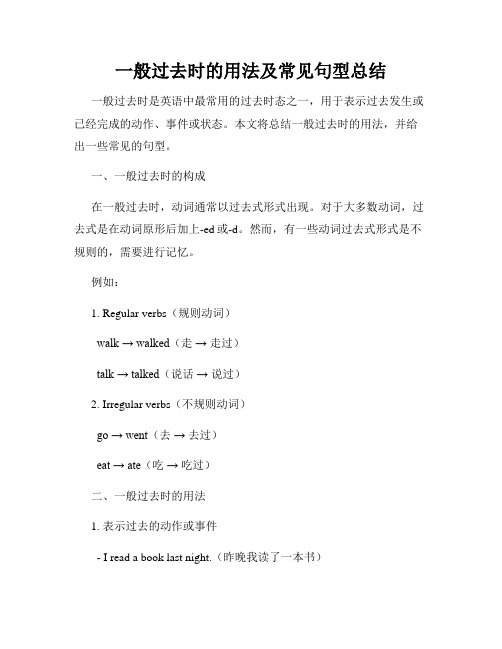
一般过去时的用法及常见句型总结一般过去时是英语中最常用的过去时态之一,用于表示过去发生或已经完成的动作、事件或状态。
本文将总结一般过去时的用法,并给出一些常见的句型。
一、一般过去时的构成在一般过去时,动词通常以过去式形式出现。
对于大多数动词,过去式是在动词原形后加上-ed或-d。
然而,有一些动词过去式形式是不规则的,需要进行记忆。
例如:1. Regular verbs(规则动词)walk → walked(走→ 走过)talk → talked(说话→ 说过)2. Irregular verbs(不规则动词)go → went(去→ 去过)eat → ate(吃→ 吃过)二、一般过去时的用法1. 表示过去的动作或事件- I read a book last night.(昨晚我读了一本书)- They went to the cinema yesterday.(他们昨天去了电影院)- She cooked dinner for her family.(她为家人做饭)2. 表示过去的习惯或常态- We always played basketball after school.(我们放学后经常打篮球) - He used to live in Paris.(他过去住在巴黎)- She would often visit her grandparents.(她经常去看望她的祖父母)3. 用于时间状语从句一般过去时可以与一些表示过去的时间状语连用,如yesterday(昨天)、last week(上周)、in 2005(在2005年)等。
- I saw him yesterday.(我昨天见到了他)- She called me last night.(她昨晚给我打电话了)- They visited the museum in 2005.(他们在2005年参观了博物馆)4. 否定句和疑问句的构成在一般过去时的否定句和疑问句中,需要使用助动词did,并且动词恢复成原形。
一般过去时句型

一般过去时句型
一般过去时是英语中表示过去发生的动作或状态的一种时态。
以下是一些常见的一般过去时的句型:
1. 肯定句:主语 + 动词过去式(例如:I walked to school yesterday.)
2. 否定句:主语 + did not (didn't) + 动词原形(例如:She didn't go to the party last night.)
3. 疑问句:Did + 主语 + 动词原形?(例如:Did you watch the movie last night?)
4. 特殊疑问句:特殊疑问词 + did + 主语 + 动词原形?(例如:What did you do yesterday?)
5. 简单过去时的时间状语:yesterday, last week, in 2010等(例如:I went to Paris last year.)
6. 简单过去时的被动语态:was/were + 动词的过去分词 (例如:The book was written by Mark Twain.)
7. 简单过去时的完成时态:had + 动词的过去分词 (例如:He had finished his homework before dinner.)
8. 简单过去时的进行时态:was/were + 现在分词 (例如:They were watching TV when
I arrived.)。
七年级时态讲解(三)一般过去时
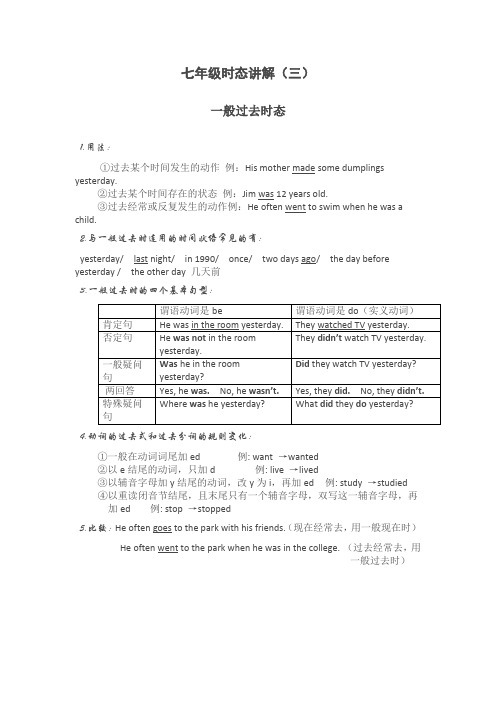
七年级时态讲解(三)
一般过去时态
1.用法:
①过去某个时间发生的动作例:His mother made some dumplings yesterday.
②过去某个时间存在的状态例:Jim was 12 years old.
③过去经常或反复发生的动作例:He often went to swim when he was a child.
2.与一般过去时连用的时间状语常见的有:
yesterday/ last night/ in 1990/ once/ two days ago/ the day before yesterday / the other day 几天前
3.一般过去时的四个基本句型:
4.动词的过去式和过去分词的规则变化:
①一般在动词词尾加ed 例: want →wanted
②以e结尾的动词,只加d 例: live →lived
③以辅音字母加y结尾的动词,改y为i,再加ed 例: study →studied
④以重读闭音节结尾,且末尾只有一个辅音字母,双写这一辅音字母,再
加ed 例: stop →stopped
5.比较:He often goes to the park with his friends.(现在经常去,用一般现在时)
He often went to the park when he was in the college. (过去经常去,用
一般过去时)。
一般过去时的用法及结构
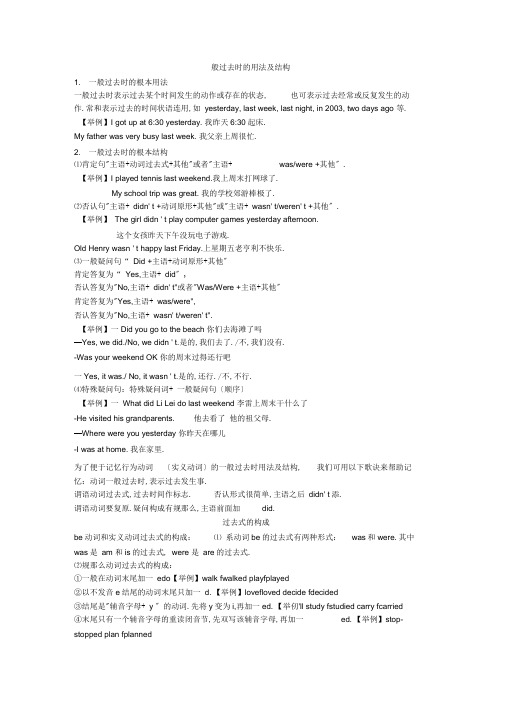
般过去时的用法及结构1. 一般过去时的根本用法一般过去时表示过去某个时间发生的动作或存在的状态, 也可表示过去经常或反复发生的动作.常和表示过去的时间状语连用,如yesterday, last week, last night, in 2003, two days ago 等.【举例】I got up at 6:30 yesterday. 我昨天6:30起床.My father was very busy last week. 我父亲上周很忙.2. 一般过去时的根本结构⑴肯定句"主语+动词过去式+其他"或者"主语+ was/were +其他〞.【举例】I played tennis last weekend.我上周末打网球了.My school trip was great. 我的学校郊游棒极了.⑵否认句"主语+ didn' t +动词原形+其他"或"主语+ wasn' t/weren' t +其他〞.【举例】The girl didn ' t play computer games yesterday afternoon.这个女孩昨天下午没玩电子游戏.Old Henry wasn ' t happy last Friday.上星期五老亨利不快乐.⑶一般疑问句“ Did +主语+动词原形+其他〞肯定答复为“ Yes,主语+ did〞,否认答复为"No,主语+ didn' t"或者"Was/Were +主语+其他〞肯定答复为"Yes,主语+ was/were",否认答复为"No,主语+ wasn' t/weren' t".【举例】一Did you go to the beach 你们去海滩了吗—Yes, we did./No, we didn ' t.是的,我们去了./不,我们没有.-Was your weekend OK 你的周末过得还行吧一Yes, it was./ No, it wasn ' t.是的,还行./不,不行.⑷特殊疑问句:特殊疑问词+ 一般疑问句〔顺序〕【举例】一What did Li Lei do last weekend 李雷上周末干什么了-He visited his grandparents. 他去看了他的祖父母.—Where were you yesterday 你昨天在哪儿-I was at home. 我在家里.为了便于记忆行为动词〔实义动词〕的一般过去时用法及结构, 我们可用以下歌诀来帮助记忆:动词一般过去时,表示过去发生事.谓语动词过去式,过去时间作标志. 否认形式很简单,主语之后didn' t添.谓语动词要复原.疑问构成有规那么,主语前面加did.过去式的构成be动词和实义动词过去式的构成:⑴ 系动词be的过去式有两种形式:was和were.其中was是am 和is的过去式, were 是are的过去式.⑵规那么动词过去式的构成:①一般在动词末尾加一edo【举例】walk fwalked playfplayed②以不发音e结尾的动词末尾只加一d.【举例】lovefloved decide fdecided③结尾是"辅音字母+ y 〞的动词.先将y变为i,再加一ed.【举仞'll study fstudied carry fcarried④末尾只有一个辅音字母的重读闭音节,先双写该辅音字母,再加一ed.【举例】stop-stopped plan fplanned规那么动词的过去式构成方法可用以下口诀来记忆:过去式构成有规律,一般词尾加一ed如果词尾有个e 〔不发音的〕,只需直接加上一d. “辅音字母+ y 〞在词尾,变y为i加一ed.“一辅重闭〞作尾巴,双写之后加一ed.随堂练习:一.写出以下动词的过去式./is _________ ___________ _____________ ____________'t 6. aren' t二.用适当的词完成以下对话.1.— How was your weekend — It great.一What _ you_ last weekend — I _ some homework.to the beach.2. 一What last weekend She3. —What —___ they do last weekend —They ___ ___ to the movies.三.用括号内所给词的适当形式填空.1. We(enjoy) ourselves at the party last night.(study) for the English test last Sunday.you(go) to the Great Wall last year4. What day(be) it yesterdayold man(be)ill and went to see a doctor.(have) a party last night.(visit) the museum and went home.8.— How(be) the students — They were very friendly.often(have) supper at home. Today he(have) supper at school.had great fun(play) in the water.made me(feel) very happy.12.-he(have) lunch at nine — No, he didn ' t.(buy) a guitar yesterday.四.句型转换.1. He came here last month.(改为否认句)He here last month.1.1. hey played football this morning.(改为一般疑问句并作简略答复)一they football this morning —Yes, they./ No, they.3 .They went to Beijing last year.(就划线局部提问)they last year.4 .Tom watched TV last night.(改为一般疑问句)Tom TV last night5 .Mary does homework every day.(用last night 改写句子)Mary.般现在时的用法与结构1、一般现在时的定义及构成一般现在时表示现在经常反复发生的动作、存在的状态或习惯性的动作.〔1〕 be〔am,is,are〕动词:〔作谓语动词时〕肯定句:主语+be动词〔am,is,are〕+其它.如:①I am a student.〔主语+be动词+名词〕②They are hungry.〔主语+be动词+形容词〕③He is out.〔主语+be动词+副词〕④That pen is mine.〔主语+be动词+ 代词〕⑤I am fifteen.〔主语+be动词+数词〕⑥The bike is under the tree.〔主语+be动词+H司短语〕运用am,is,are写三个句子否认句:主语+ be〔am,is,are〕 + not +其它.如:He is not a worker.他不是工人. 运用am,is,are 写三个句子一般疑问句:Be〔am,is,are〕 +主语+其它.如:-Are you a student -Yes. I am. / No, I'm not.运用am,is,are 写三个句子特殊疑问句:疑问词+一般疑问句.如:Where is my bike 运用am,is,are 写三个句子特殊疑问句:疑问词〔what, where, who, when, which, whose, how, how many, how much, what shape,what colour,〕,找句子中有没有be动词〔is, am或者are〕或情态动词或者助动词〔特殊疑问句:疑问词+be动词〔is, am或者are〕或情态动词或者助动词+其他〕〔2〕行为动词:主语+ 行为动词+ 〔其它〕.〔作谓语动词时〕1〕主语不是第三人称单数时,肯定句为:主语+动词原形+其它否认式为:主语+don't+动词原形+其它疑问句为:Do+主语+动词原形+其它. ① We speak Chinese.②Do you speak Chinese ---Yes, I do. / No, I don't.③They don't speak Chinese.写三个句子2〕当主语是第三人称单数时:〔he,she,it,A/An,单独的人或事物:Lily/book〕肯定句为:主语+动词〔词尾加s或es〕 +其它.否认式为:主语+doesn't+动词原形+其它.疑问句式:Does+主语+动词原形+其它①He speaks English.②He doesn't speaks English.③-Does she go to work by bike Yes, she does. / No, she doesn't.写三个句子特殊疑问句:疑问词+一般疑问句.如:How does your father go to work3〕动词+s的变化规那么〔1〕一般情况下,直接加-s,如:cook-cooks, milk-milks〔2〕以s. x. sh. ch. o 结尾,力口-es, 如: guess-guesses, wash-washes, watch-watches, go-goes 〔3〕以"辅音字母+y"结尾,变y为i,再加-es,如:study-studies〔3〕情态动词〔作谓语动词时〕〔can,could,be able to,may,might,must,have to,need,shall,should, will,would〕时,句子结构为:肯定句:主语+情态动词+动词原形.否认句:主语+情态动词+not+动词原形一般疑问句;情态动词+主语+动词原形+其他特殊疑问句:疑问词+情态动词+主语+动词原形+其他Eg:① He can speak English.② Can I help you What can I do for you在实际应用中,一般现在时常与以下时间状语联用:always, usually, often, sometimes, every week (day, year, month …), once a week, on Sundays 例句:He usually plays football on Sundays.一、写出以下动词的第三人称单数talk forget hope stop perform play saybuy worry fly study like make take__love recite become come drive二、句型转换1. The children have a good time in the park.否认句:_______________________________________________一般疑问句:_____________________________________________对划线局部提问:_________________________________________2. There is about nine hundred people at the concert.否认句:_______________________________________________一般疑问句:_____________________________________________对划线局部提问:_________________________________________3. Ann does her homework yesterday evening.否认句:_______________________________________________一般疑问句:_____________________________________________对划线局部提问:_________________________________________4. I read an English book.否认句:______________________________________________一般疑问句:_____________________________________________肯定/否认答复:________________________________________对划线局部提问:_________________________________________5. My brother is in the park just now.否认句:______________________________________________一般疑问句:_____________________________________________对划线局部提问:_________________________________________一般现在时第三人称单数句型转换练习1. I go to school before 7:00 in the morning.(he ) __________________________________________________________2. I always go shopping with my mum on Sunday.( she ) ________________________________________________________2.1 sometimes play computer games after school on Sunday.( he ) _________________________________________________________4. I always take exercise after class on Monday.( my mother ) ________________________________________________________般过去时详细讲解与练习题一、巧记一般过去时:动词一般过去时,表示过去发生的事;be用was或用were, have,has变had;谓语动词过去式,过去时间作标志;一般动词加-ed,假设是特殊得硬记.否认句很简单,主语之后didn' t添;疑问句也不难,did放在主语前;}不含be动词时如果谓语之前有did,谓语动词需复原;动词假设是was,were,否认就把not添. }含be动词时疑问句也不难,要把was, were放在主语前.二、be的一般过去时:学习动词be的一般过去时,下面有一口诀,它可以帮你们更好地掌握动词be的一般过去时.be的过去时有四巧:一是时间状语巧,表示过去的短语要记牢;二是形式巧,单数was,复数were ;三巧是否认句结构, not紧跟was/were ;四是疑问句式巧,was/were向前跑(提前).【一巧】时间状语(即标志词)巧.一般过去时表示过去发生的动作或存在的状态,恰巧与表示过去的一些时间状语连用.1 . yesterday 或以其构成的短语:yesterday morning(afternoon, evening) 等;2 .由“last+-时间名词〞构成的短语:last night, last year (winter, month, week)等;3 .由“时间段+ago〞构成的短语: a moment ago, a short time ago, an hour ago 等;4 .其它:just now 等5 .由某些表示过去时态的从句等.【二巧】形式巧.它与一般现在时一样,形式多样:当主语是第一人称单数或第三人称单数时,谓语动词用was;主语是第二人称或其他人称复数时,谓语动词用were.例如:I was in the classroom yesterday morning . 昨天早上我在教室里.He was at school last Tuesday. 上周二他在学校.They were over there a moment ago . 刚刚他们在刃B边.【三巧】否认句结构巧.与动词be的一般现在时一样, 它在动词后面加not即可变成否认句,并且was, were与not可以缩写成wasn't, weren't o即:主语 + wasn't/ weren't + 表语 +其他.例如:I was not (= wasn't) here yesterday . 昨天我不在这儿.My parents were not ( = weren't) at home last Sunday . 上周日我父母不在家.【四巧】疑问句式巧.把was, were 提到句首,句末用问号即可变为一般疑问句. 即: Was(Were) +主语+表语+其他这恰巧与动词be 的一般现在时的疑问句式相似.例如: Were you at home the day before yesterday ? 前天你在家吗Was she late this morning?今天早上她迟到了吗更巧的是疑问句的答语也相似,肯定答复用“ Yes,主语+ was/were . 否认答复用“No,主语+ wasn't/weren't .".例如:一Were Wei Hua and Han Mei here just now ?刚刚魏华和韩梅在这儿吗— Yes, they were. (No, they weren't .)是的,她们在.(不,她们不在.)一、单项选择: 从以下各题后所给的四个选项中选择最正确答案填空. (10)( )1. My father ill yesterday . A isn't B. aren't C. wasn't D. weren't ()2. your parents at home last week ?A IsB WasC AreD Were()3. The twins in Dalian last year.They here now .A are; wereB . were; areC was; areD were; was ()4. your father at work the day yesterday (前天)? A. Was; before B. Is; beforeC. Was; afterD. Is; after()5. —Who was on duty last Friday ?A I amB I wasC Yes, I wasD No, I wasn't ()6. I cleaned my classroom.A with three hoursB three hours agoC in three hoursD three hours before ( )7. I came my house two days ago .A back onB back toC to backD back () 8 . He did some reading at home.A What does your father do yesterday eveningB What does your brother do in the schoolC What did your brother do over the weekendD Where did your brother go last Sunday ()9. What did you do I went to the movies.A next morning Bover the weekend C in the weekend D next Monday ()10. The koala sleeps, but gets up. A during the day; at the eveningB at day during nightC in the day during the eveningD during the day ; at night二、请用正确动词形式填空.(10)1. I ______2.__ (have) an exciting party last weekend. _ she _______ (practice) her guitar yesterday No, she ___________ 3. What____ T om _______ (do) on Saturday eveningHe ______ _(watch) TV and _________ (read) an interesting book. 4. They all________ (go) to the mountains yesterday morning.5.She ____ ____ (not visit) her aunt last weekend.She _____ ___ (stay) at home and _______ (do) some cleaning.6. When __ ____ you ________ (write) this song I _________ (write) it last year.7 .My friend, Carol,〔study〕 for the math test and〔practice〕 English last night.8 .Mr. Li〔do〕 the project on Monday morning Yes, he.9 . How〔be〕 Jim's weekend It〔be not〕 bad.10 .〔be〕 your mother a sales assistant last year No. she.三、译以下句子〔20〕1 .我过了一个忙碌但却刺激的周末.I ______________________________________ exciting weekend.2 . Jenny喜欢看书.昨晚她看了一本英语书.Jenny likes. She an English book last night.3 . Emma每天都看电视.可是昨天他没有看.Emma TV every day. But he yesterday.4 .上周六他们做什么了他们做作业和购物了.What they SaturdayThey homework and.5 .今天早上方方得做饭,由于他父亲不在家.This morning Fangfang ________________ because his father yesterday.6 .你还有什么要说的What would you like7 .放学另U忘了向老说声再见. Don, t forget ____________________________ the teacher.8 .为什么你昨晚没有看电视Why you TV last night9 .他在清扫教室的时候,发现地上有块表.When he the classroom, he a watch on the ground.10 .他什么时候出生的1980年.--When he---1980.四、改写句子:〔20〕1、Lucy did her homework at home.〔改否认句〕Lucy her homework at home.2、He found some meat in the fridge 〔冰箱〕.〔变一般疑问句〕 he meat in the fridge3、There was some orange in the cup.〔变一般疑问句〕 there orange in the cup4. Frank read an interesting book about history. 〔一般疑问句〕Frank an interesting book about history5. Why not go out for a walk 〔同义句〕out for a walk6. Thomas spent RMB 10 on this book.〔否认句〕Thomas RMB 10 on this book.7. My family went to the beach last week.〔划线提问〕family last week8. I think she is Lily' s sister.〔否认句.注意否认转移〕9. Sally often does some reading in the morning. 〔否认句〕Sally often some reading in the morning.10. He is a tall, thin boy.〔划线提问〕_ he五、改错题(20)1. How is Jane yesterday2. He go to school by bus last week.3. He often goes home at 6:00 last month.4. I can fly kites seven years ago. _____________________________5. Did you saw him just now. ___________________________________6. Tom wasn' t watch TV last night. _____________________________________7. I didn ' t my homework yesterday. ____________________________________8. He wait for you three hours ago. ___________________________________9. Who find it just now ________________________________________make him cry (哭)just now __________________________________六、完形填空(10)Tom did not like doing his homework , because he liked to do some 1 things after school . And his teacher always 2 a lotof mistakes in his homework .Then one day, his maths teacher 3 at Tom' s homework and saw that he got all hisanswers right . He was very 4 and surprised (惊奇).The next morning before class ,he called Tom 5 his desk and 6 to him , “You got all your homework right thistime . Did your father help you " Sometimes Tom' s father helped him with his homework , 7 this time he didn ' t help Tom because he 8 at home . So Tom answered, " NO,Sir. He Was busy last night, so I 9 to do it 1010. . A. others B. another C . the other D. other11. . A. made B. found C. looked at D. looked12. . A. laughed B. knocked C. looked D. saw13. . A. please B. pleased C. pleasure D. sad14. . A. to B. forC. inD. at15. . A. talked B. asked C. spoke D. said16. . A. and B. but C. so D. or17. . A. isn' t B. won' tbeC. wasn' t D. can' t be18. . A. wanted B . mustn ' t C. liked D. had19. 0. A. itself B . of them C . myself D. himself七.写作(10).日记一那么,字数50---60.记叙一天的活动:1 .早晨起床,吃饭,上学;2 .上午的课程,并就其中一堂课进行描述; 3.午休的活动;4.下午的课程及作业;5.晚上的安排.答案:一、单项选择:1---5 CDBAB 6----10 BBCBD二、 2. Did; practice; didn't ; do; watched; read5.didn't visit; stayed; did write; wrote ; practiced8. Did; do;did ; wasn't 10. Was; wasn't三、 a busy but books; read; didn't watch TV ; do last; did their; went shoppingto cook breakfast; wasn't at home ; to say; say goodbye to ; watch ; found ; born; In四、't do 2. Did; find any 3. Was; any4. Did; read5. Why don't you go 't spend did your; go 8. I don't think she is Lily's sister 't; do. 10. What does; look like五、't didn't7.在didn't 后力口do六、1----5 DBCBA 6——10 DBCDC七、写作〔略〕。
一般过去时的常见句型

一般过去时的常见句型一般过去时是英语中描述过去发生的动作、情况或事件的一种时态。
以下是一些常见的一般过去时的句型。
1. 肯定句型:- 主语 + 动词过去式 + 其他例如:I went to the store yesterday.- 主语 + was/were + 其他例如:They were happy to see each other.2. 否定句型:- 主语 + did not + 动词原形 + 其他例如:He did not watch the movie last night.- 主语 + was/were not + 其他例如:She was not home when I called.3. 疑问句型:- Did + 主语 + 动词原形 + 其他?例如:Did you eat dinner yet?- Was/Were + 主语 + 其他?例如:Were they at the party?4. 简略回答:- Yes, 主语 + did.例如:Yes, I did.- No, 主语 + didn't.例如:No, she didn't.5. 时间状语的使用:- 表示过去的时间状语词(如yesterday, last week)可以用来指明动作发生的时间。
例如:She visited her grandmother last month.- 表示频率的时间状语词(如always, often)可以用来描述过去的经常性动作。
例如:He always went for a run in the morning.这些是一般过去时的常见句型,希望对您有所帮助!。
- 1、下载文档前请自行甄别文档内容的完整性,平台不提供额外的编辑、内容补充、找答案等附加服务。
- 2、"仅部分预览"的文档,不可在线预览部分如存在完整性等问题,可反馈申请退款(可完整预览的文档不适用该条件!)。
- 3、如文档侵犯您的权益,请联系客服反馈,我们会尽快为您处理(人工客服工作时间:9:00-18:30)。
一般过去时在几种常见句型中的运用
动词直接用一般过去时,后面常有提示性的时间状语,如:yesterday, last day off/week/ Saturday/year, two days ago, just now, in+年份…Eg: 她上个休息日开车去兜风了。
She last day off.
was/ were+ not
didn’t + do (动词原形)
eg: There were some apples on the table.
He bought some gifts for his parents.
1.含有be 动词的,把was/ were提到句首,原句中有some变为any
2.没有be动词的, 句首加助动词Did+主语+do (动词原形)+其它?Eg: 1. There was some water in the bowl.
2. He slept late last day off.
常见特殊疑问词:
Where—对地点进行提问
What—一般对动作进行提问
How—一般对形容词或交通方式进行提问
When—对时间进行提问
Who—对人提问
1.Sonia went to Blue Water Aquarium on last day off.
2.Sonia went to Blue Water Aquarium on last day off.
3.Sonia went to Blue Water Aquarium on last day off.
4.Tina bought some gifts for his parents yesterday.
5.Our school trip was terrible.。
